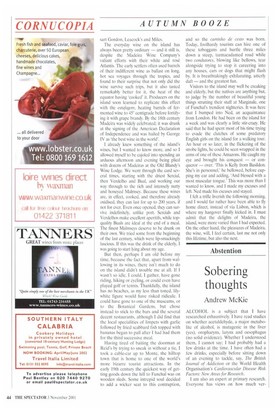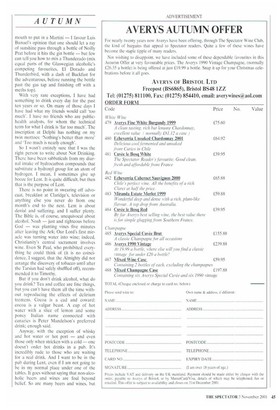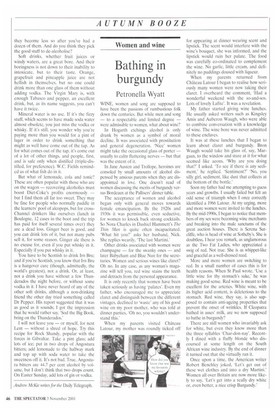Sobering thoughts
Andrew McKie
ALCOHOL is a subject that I have researched exhaustively. I have read studies on whether acetaldehyde, a major metabolite of alcohol, is mutagenic in the liver (yes), oropharynx, larynx and oesophagus (no solid evidence). Whether I understood them, I cannot say; I had probably had a few drinks at the time. I have often had a few drinks, especially before sitting down of an evening to tackle, say, The British Journal of Addiction or the World Health Organisation's Cardiovascular Disease Risk Factors: New Areas for Research.
I am also an expert at primary research. Everyone has views on how much ver
mouth to put in a Martini — I favour Luis Bunuel's opinion that one should let a ray of sunshine pass through a bottle of Noilly Prat before it hits the gin bottle — but few can tell you how to mix a Thunderado (mix equal parts of the Glaswegian alcoholic's competing favourites, El Dorado and Thunderbird, with a dash of Buckfast for the adventurous, before running the bottle past the gas tap and finishing off with a meths top).
With very rare exceptions, I have had something to drink every day for the past ten years or so. On many of those days I have had what my friends would call `too much'. I have no friends who are publichealth analysts, for whom the technical term for what I drink is 'far too much'. The inscription at Delphi has nothing on my twin mottoes: 'Nothing's better than more' and 'Too much is nearly enough'.
So I wasn't entirely sure that I was the right person to write about Not Drinking. There have been sabbaticals from my diurnal intake of hydrocarbon compounds that substitute a hydroxyl group for an atom of hydrogen. I mean, I sometimes give up booze for Lent. It is quite difficult, but then that is the purpose of Lent.
There is no point in swearing off advocaat, breakfast at Claridge's, television or anything else you never do from one month's end to the next. Lent is about denial and suffering, and I suffer plenty. The Bible is, of course, unequivocal about alcohol. Noah — just and righteous before God — was planting vines five minutes after leaving the Ark; Our Lord's first miracle was turning water into wine; indeed, Christianity's central sacrament involves wine. Even St Paul, who prohibited everything he could think of (it is no coincidence, I suggest, that the Almighty did not arrange the discovery of tobacco until after the Tarsian had safely shuffled off), recommended it to Timothy.
But if you don't drink alcohol, what do you drink? Tea and coffee are fine things, hut you can't have them all the time without reproducing the effects of delirium tremens. Cocoa is a cad and coward: cocoa is a vulgar beast. A cup of hot water with a slice of lemon and some poncy Italian name connected with canaries is Peter Mandelson's preferred drink; enough said.
Anyway, with the exception of whisky and hot water or hot port — and even those only when stricken with a cold — one doesn't order hot drinks in a pub. It's incredibly rude to those who are waiting for a real drink. And I want to be in the pub during Lent, even if I am not going to be in my normal place under one of the tables. It goes without saying that non-alcoholic beers and wines are foul beyond belief. So are many beers and wines, but
they become less so after you've had a dozen of them. And do you think they pick the good stuff to de-alcoholise?
Soft drinks, whether fruit juices or windy waters, are a great bore. And their boringness is not down to their inability to intoxicate, but to their taste. Orange, grapefruit and pineapple juice are not hellish in themselves, but no one could drink more than one glass of them without adding vodka. The Virgin Mary is, with enough Tabasco and pepper, an excellent drink, but, as its name suggests, you can't have it twice.
Mineral water is no use. If it's the fizzy stuff, which seems to have made soda water almost obsolete, you just miss the vodka or whisky. If it's still, you wonder why you're paying more than you would for a pint of lager in order to drink something that might as well have come out of the tap. As for what comes out of the tap, it's come out of a lot of other things, and people, first, and is safe only when distilled (triple-distilled, for preference). W.C. Fields reminded us of what fish do in it.
But what of lemonade, cola and tonic? These are often popular with those who are on the wagon — recovering alcoholics must boost Diet-Coke's profits enormously — but I find them all far too sweet. They may be fine for people who normally paddle in the learners' pool of alcopops, but for crossChannel drinkers like ourselves (lunch in Boulogne. 12 cases in the boot and the trip has paid for itself several times over) they are a dead loss. Ginger beer is good, and you can drink lots of it, but not many pubs sell it, for some reason. Ginger ale there is no excuse for, even if you put whisky in it. Especially if you put whisky in it.
You have to be Scottish to drink Irn Bru; and if you're Scottish, you know that Ern Bru is a hangover cure (though, admittedly, the world's greatest), not a drink. Or, at least, not a drink you have without a few Thunderados the night before, or without some vodka in it. I have never heard of any of the other soft drinks, although a non-drinking friend the other day tried something called Dr Pepper. His report suggested that it was as good as it sounds; I got the impression that he would rather say, 'Sod the Big Book, bring on the Thunderados.'
I will not leave you — or myself, for next Lent — without a shred of hope. Try this recipe for Rock Shandy, popular with the forces in Gibraltar. Take a pint glass; add lots of ice; put in two drops of Angostura bitters; add lemonade to the halfway mark and top up with soda water to take the sweetness off it. It's not bad. True, Angostura bitters are 44.7 per cent alcohol by volume. but I don't think that two drops count. On Easter Sunday, add lots of gin or vodka.




















































































 Previous page
Previous page